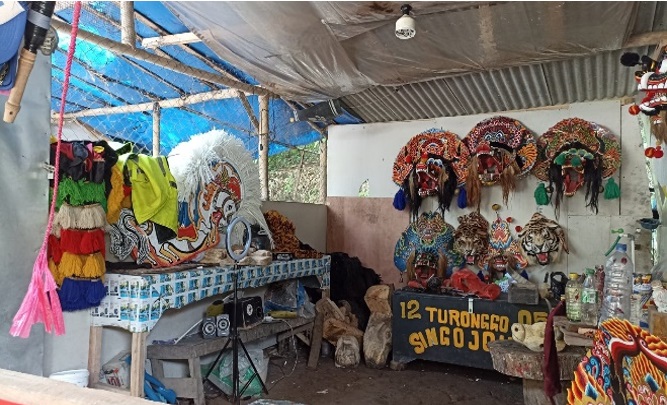Peningkatkan Perekonomian Masyarakat Dengan Mengembangkan Ekowisata Berbasis Kearifan
Main Article Content
Abstract
Jenggolo Village is one of the villages in Malang Regency. The number of people aged 20-59 who have not worked is 430 people from the total workforce of around 2382 people. Jenggolo Village has ecotourism potential in the form of Sumber Songo and heritage sites of the Jenggolo Kingdom. This study aims to develop ecotourism based on local wisdom to improve the economy of the community in Jenggolo Village. Development will focus on improving ecotourism governance, marketing Sumber Songo and royal sites, creating accountable and transparent financial audits, establishing conservation mechanisms, and increasing community involvement, both in conservation and economic activities. This study also aims to develop a participatory and collaborative learning model between students, lecturers, communities and village officials in managing ecotourism sites. The research method used is a qualitative method which includes the stages of action research, formulation of village policies, and development research. At the action research stage, problem analysis will be carried out, business strategy design through the Business Model Canvas, implementation and evaluation will be carried out. Then proceed with the formulation of village policies and the last stage is the creation of learning models MBKM.
Article Details

Jurnal Pemberdayaan Masyarakat is licensed under a Creative Commons Attribution 4.0 International License.
References
Adhitya, D., Maesyaroh, W., & Tanjung, I. (2021). Kondisi Tingkat Pengangguran di Indonesia Pada Masa Pandemi Covid-19: Studi Kasus Dengan Pendekatan Metode ARIMA. Jurnal Ilmiah Manajemen Ekonomi Dan Akuntansi, 5(2).
Antonellis Jr, P. J., & Berry, G. (2017). Practical steps for the utilization of action research in your organization: A qualitative approach for non-academic research. International Journal of Human Resource Studies, 7(2).
Baskoro, M. (2016). Pengelolaan kawasan ekowisata berbasis masyarakat serta implikasinya terhadap ketahanan masyarakat desa Sukarara. Urnal Green Growth Dan Manajemen Lingkungan, 5(2), 18–28.
Bintari, A., & Pandiangan, L. H. S. (2016). Formulasi Kebijakan Pemerintah Tentang Pembentukan Badan Usaha Milik Daerah (Bumd) Perseroan Terbatas (Pt) Mass Rapid Transit (Mrt) Jakarta Di Provinsi Dki Jakarta. Jurnal Ilmu Pemerintahan.
Carvache-Franco, M., Carvache-Franco, W., & Manner-Baldeon, F. (2022). Market segmentation based on ecotourism motivations in marine protected areas and National Parks in the Galapagos Islands, Ecuador. Journal of Coastal Research, 37(3).
Djuwendah, E., Tuhpawana, P. S., Yosini, D., Fatimah, S., & Lucyana, T. (2018). Kajian Potensi Ekowisata Dalam Menunjang Pengembangan Wilayah Pada Sub DAS Cikandung Dan Kawasan Gunung Tampomas Kabupaten Sumedang. Urnal Agribisnis Terpadu, 11(4), 1–14.
Dudin, M., Lyasnikov, N. V. E., Sidorenko, V. N., Leont’va, L. S., & Reshetov, K. J. E. (2015, April). Business Model Canvas as a basis for competitive advantage of enterprise structures in agroindustrial sphere (english version). Bioscience Biothechnology Resistence Asia.
Elliott, J. (2005). Using narrative in social research: Qualitative and quantitative approaches. Sage.
Fahriansyah, F., & Yoswaty, D. (2012). Ecotourism development in Tanjung Balai District, North Sumatera: Mangrove forest ecological factors. Jurnal Ilmu Dan Teknologi Kelautan Tropis, 4(2).
Gunawan, S. (2019). Kebijakan Pembangunan Pariwisata Yang Berwawasan Lingkungan Di Kabupaten Gunungkidul. Widya Pranata Hukum: Jurnal Kajian Dan Peneliti Hukum, 1(2).
Khan, A. M., Musthofa, I., Aminuddin, I., Handayani, F., Kuswara, R. N., Wulandari, A., Khadijah, U., & Novianti, E. (2020). Wisata Kelautan Berkelanjutan di Kabupaten Wakatobi, Sulawesi Tenggara: Sebuah Studi Tentang Persepsi Masyarakat Kawasan Pesisir. Khasanah Ilmu-Jurnal Pariwisata Dan Budaya, 11(2).
Maulana, I., & Aprianto, M. C. (2018). Strategi Pengembangan Ekowisata Berbasis Ekonomi Kearifan Lokal: Sebuah Kasus di Kampung Tajur, Purwakarta. Eqien-Jurnal Ekonomi Dan Bisnis, 5(2).
Musadad, M., Nurlena, N., & Saeroji, A. (2020). Penggunaan Istilah “Wisata Alam” dan "Ekowisata di Indonesia: Sebuah Telaah Singkat. Journal of Tourism Destination and Attraction, 8(2).
Prathama, A., Nuraini, R., & Firdausi, Y. (2020). Pembangunan Pariwisata Berkelanjutan Dalam Perspektif Lingkungan (Studi Kasus Wisata Alam Waduk Gondang di Kabupaten Lamongan). Jurnal Sosial Ekonomi Dan Politik (JSEP), 1(3), 29–38.
Ridlwan, M. A., Muchsin, S., & Hayat, H. (2017). Model Pengembangan Ekowisata dalam Upaya Pemberdayaan Masyarakat Lokal. Politik Indonesia: Indonesian Political Science Review, 2(2).
Salsabilla, Y. P., & Mirzanti, I. R. (2022). Value Proposition Design Testing for Developing Fashion Business. European Journal of Business and Management Research, 7(4).


